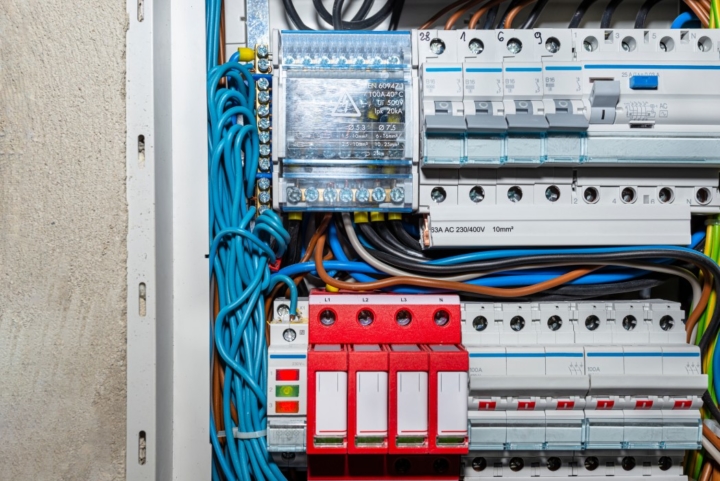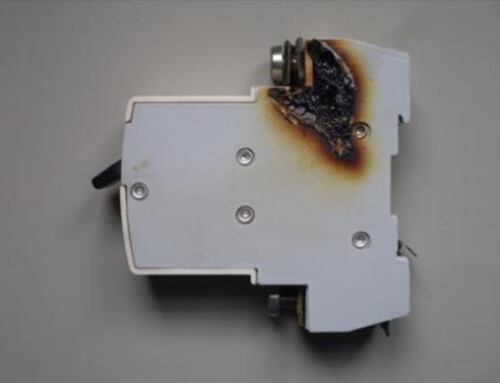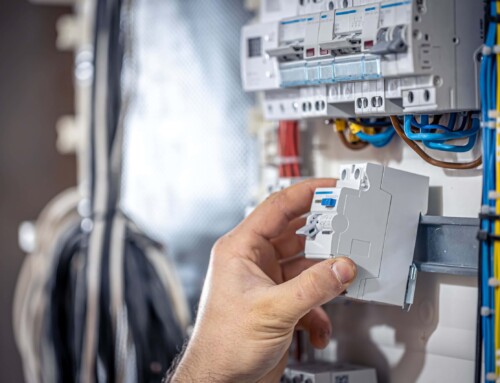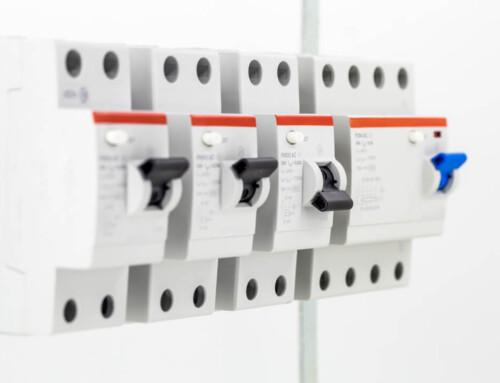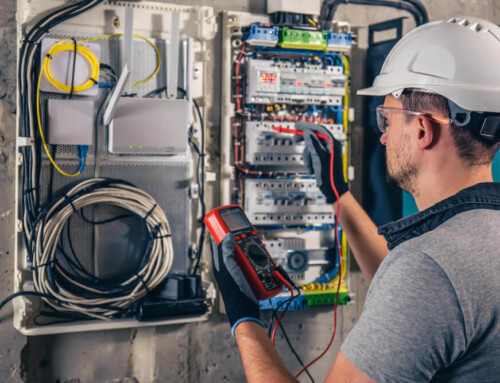Table of Contents
There is more to electrical systems than meets the eye. They are complex networks with several components that work together to keep your homes and businesses running smoothly. A critical component is to avoid possible risks. But what precisely makes these systems safe? This is when the discussion regarding fuse vs. circuit breaker comes into play.
These two critical devices play an essential role in safeguarding electrical circuits from damage caused by overcurrent or short circuits. Understanding the distinctions between them allows you to make an informed decision for your specific requirements.
Curious to learn more? Let’s get into the realm of fuse box vs. circuit breaker!
What is a Fuse?
Simply described, a fuse is a safety device that protects electrical circuits from excessive current flow, hence avoiding potential damage or fire threats.
What is the Structure of a Fuse?
A fuse is generally made of a metal wire or strip that melts when too much electricity goes through it. To enhance safety, the structure is often encased in non-combustible housing.
How Does a Fuse Manage to Interrupt the Circuit?
When the current in the circuit exceeds the fuse’s rated capacity, the heat melts the metal wire or strip. This melting action disrupts the circuit, essentially stopping the flow of electricity. This avoids future harm to both the linked devices and the circuit itself.
What is a Circuit Breaker?
A circuit breaker is an important safety element in electrical systems. They are intended to safeguard an electrical circuit against harm caused by an overload or short circuit.
What is the Structure of a Circuit Breaker?
The circuit breaker’s components include the frame, operating mechanism, contacts, and arc extinguisher. All these parts work together to guarantee its proper operation. The frame provides structural support, while the operational mechanism opens and closes the contacts.
How Does a Circuit Breaker Manage to Interrupt the Circuit?
When a defect is detected, the contacts separate, and the arc extinguisher extinguishes the resulting electrical arc. This interruption stops the flow of power, averting potential damage to the system.
Differences Between Circuit Breaker and Fuse
The Differences Between Fuse and Circuit Breaker is that a fuse is a one-time-use safety device that melts and breaks an electrical circuit when there’s too much current, like a built-in sacrificial link. Once it blows, you have to replace it with a new one. On the other hand, a circuit breaker is like a reusable switch that automatically trips and interrupts the circuit during an overload or short circuit. Instead of needing replacement, you can usually just reset a circuit breaker by flipping a switch or pressing a button, making it more convenient in the long run.
Here’s a breakdown of key differences:
-
Reusability
Fuses are sacrificial devices designed to protect electrical circuits by melting and breaking the circuit when an excessive current flows through them. This melting action is a one-time affair—once a fuse blows, it must be replaced.
In contrast, circuit breakers are designed for repeated use. When a circuit breaker trips due to an overload or short circuit, it can be reset either manually or automatically.
-
Operation Principle
Fuses contain a thin metal wire or strip that melts when the current exceeds a particular value, thereby interrupting the circuit.
Circuit breakers employ more complex mechanisms. They can utilize electromagnetic, thermal, or a combination of these principles to detect overcurrent. When an overload occurs, the breaker trips, opening the circuit.
-
Response Time
When an overcurrent occurs, the fuse wire melts almost instantaneously. However, this rapid response can sometimes lead to nuisance tripping in cases of temporary, non-threatening spikes.
Circuit breakers, while slightly slower in response time, offer greater precision. They can be adjusted to trip at specific current levels and durations, reducing the likelihood of nuisance trips.
-
Switching Action
Once a fuse blows, it requires manual replacement. This means an individual must physically remove the old fuse and install a new one. This can be time-consuming and inconvenient.
Circuit breakers offer the advantage of being easily reset. After tripping, they can be reset manually or automatically, depending on the type.
-
Breaking Capacity
Fuses have a relatively limited breaking capacity. So, they are less effective at interrupting high fault currents.
Circuit breakers, on the other hand, are designed to handle high fault currents. They can interrupt large currents without damage.
-
Application
Fuses are often used in simpler, less demanding electrical circuits. They are commonly found in household appliances, small electronic devices, and automotive applications where the risk of high fault currents is minimal.
Circuit breakers are more suited for complex and high-demand environments. They are widely used in residential, commercial, and industrial settings.
-
Cost
Fuses generally have a lower initial cost compared to circuit breakers. However, the need for frequent replacements can add up over time.
While circuit breakers come with a higher upfront cost, their reusability and lower maintenance requirements make them more cost-effective in the long run.
-
Safety and Reliability
Fuses are highly reliable in simple circuits due to their straightforward operation. However, their single-use nature can be a drawback in scenarios requiring frequent protection. Additionally, the manual replacement process can pose safety risks if not handled properly.
Circuit breakers offer a higher degree of safety and reliability, especially in more complex and high-demand electrical systems. Their ability to be reset and their capacity to handle higher fault currents make them a safer and more adaptable choice.
Here’s a quick recap of electrical fuse box vs. circuit breaker:
| Criteria | Fuse | Circuit Breaker |
| Reusability | Single-use | Reusable |
| Operation principle | Simple yet effective | Complex but versatile |
| Response time | Quick but not always accurate | Balanced response |
| Switching action | Manual replacement | Easy reset |
| Breaking capacity | Limited breaking capacity | High breaking capacity |
| Application | Ideal for simple circuits | Versatile and robust |
| Cost | Low initial cost | Higher initial investment but lower maintenance |
| Safety and reliability | Reliable but limited | Safe and adaptable |
Circuit Breakers vs. Fuse Box: Pros & Cons
Although both fuses and circuit breakers perform the essential task of protecting circuits from overcurrent conditions, knowing their advantages and disadvantages can help you make an informed decision.
Advantages of Fuses
- Fuses are often praised for their simplicity and cost-effectiveness.
- One of the most appealing aspects of fuses is their straightforward design. This simplicity ensures reliability, as fewer components can malfunction.
- Also, fuses are generally less expensive than circuit breakers.
Disadvantages of Fuses
- Once a fuse has blown, it must be replaced. This can be inconvenient, especially in situations where constant power is essential.
- In industrial settings, the time taken to replace a fuse can result in costly downtime.
- The lack of a reset option in fuses means that you need to keep spare fuses on hand. It adds to maintenance costs and complexity.
Advantages of Circuit Breakers
- One of the most significant advantages of circuit breakers is their ability to be reset after tripping. This feature is particularly beneficial in environments where uninterrupted power is crucial. For example, in residential settings, a tripped breaker can quickly be reset without any tools, minimizing inconvenience.
- Also, circuit breakers are designed to handle various types of current interruption scenarios, including short circuits and overloads.
- They can be customized to meet specific needs, offering protection tailored to different applications.
Disadvantages of Circuit Breakers
- The initial cost of circuit breakers is significantly higher than that of fuses. This higher cost can be a deterrent, especially for large-scale applications where numerous units are required.
- Circuit breakers are more complex than fuses, which can make them more prone to mechanical failure over time.
To conclude, choosing between a circuit breaker and a fuse involves carefully considering factors like load requirements, budget, and the environment in which they are to be used. This blog post highlighted these factors to enhance your knowledge of the subject matter. However, it is always advisable to make such choices by consulting a certified electrician.
FAQs
Should I use a fuse or a circuit breaker of 12 volts?
The precise demands of your 12V DC system dictate whether you employ a fuse or a circuit breaker. Suppose you want a low-cost solution for high-amperage systems or need strong protection from your battery bank. In that case, fuses may be the best option.
What is the primary difference between a fuse and a circuit breaker?
A fuse is a one-time-use device that melts when overloaded, whereas a circuit breaker may be reset once tripped.
How can I determine whether I have a fuse box or a circuit breaker panel?
Fuse boxes typically feature screw-in fuses, whereas circuit breakers have reversible switches.
Why does a fuse explode or a circuit breaker trip?
It happens due to reasons such as overloading the circuit, short circuits, or ground faults.
What size fuse or circuit breaker do I need?
The circuit’s electrical load determines the right size of the fuse or circuit breaker. The size should also correspond to the wiring regulations.
Can I replace a fuse with a circuit breaker?
In most circumstances, a fuse may be replaced with a circuit breaker. However, this may need changes to the electrical panel, which a competent electrician should do. This is critical to guarantee safety and adherence to local electrical codes.

